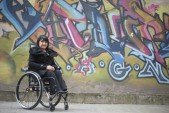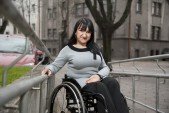Rūta Kupčinskaitė
VMU Master's degree in Subculture
A disabled person can find a lot of opportunities at the university: all it takes is determination and will
Our interviewee this time is Rūta Kupčinskaitė, VMU alum (BA in Sociology, MA in Subculture) who has been one of the leading supporters of initiatives dedicated to self-expression opportunities for the disabled at VMU and beyond.
- Can you tell us what you’re doing now?
- I’m involved in a lot of things. After I graduated from the university, many new possibilities opened, and I improved my understanding of arts, people and relationships. This encouraged me to take interest in more than one field. I’ve been busy with so many things that I can’t even say what exactly I’m doing, but it’s mostly related to arts.
- You seem like an active, friendly and fun person. Could you say that disability does not prevent you from enjoying life?
- Yes, indeed. My disability ends where the stairs end. I don’t even notice it until somebody points it out. I actually forgot my disability during my second year at VMU, when the university made it possible for everyone to study as equals: lecture rooms became disabled-friendly, etc. I can even say that now, visiting the university again, I feel completely able to participate everywhere and reach all locations. So I don’t notice my disability, really.
- Applying for university must have been quite a challenge: you graduated from high school extramurally, then you had to re-take exams and work really hard…
- Yes, I had to re-take exams, because I graduated from high school abroad. When I came to Lithuania I didn’t want to sit and stare at the wall. I came from Vilnius to Kaunas because I simply didn’t have possibilities to ride to university, let alone enter it, in that city.
So I travelled all around Lithuania: my dad helped me visit all the universities. When I came to the Open Doors Day at VMU, I just fell in love with this university. I wasn’t even thinking about any specific studies at the time: I liked the buildings, the people and the city. I was very eager to start, but I couldn’t get a room at the dormitory that day… So I spent the whole night riding around, counting the time it would take to reach the university and looking for places without bumps. Perhaps it was a bit dangerous, but nothing happened.
Some things came up so I had to take academic leave, but I still came back to university with fresh ideas and determination to continue studying.
- What was the hardest part for you during your studies?
- I was very afraid of people, I didn’t know if they would accept me. I was used to teachers being more accommodating to the disabled. When I started studying at the university, noone gave a second thought to my disability. I had the same schedule like every other student, the same 15 minutes to go from one lecture room to another. I had to hurry like everyone else, rain or shine. Perhaps it gave me discipline and desire to keep from falling behind. So the hardest part was getting used to things I did not experience in high school. It was a big challenge and an incentive to keep improving. I think I dealt with it really well.
- You chose sociology as your Bachelor’s studies and subculture as your Master’s. What was your reasoning behind these choices?
- I applied for psychology studies, but two years later I had to choose one direction: psychology or sociology. I was fascinated by sociology and relationships. Also, I really wanted to make use of the knowledge I’d acquired about social integration. I really enjoyed studying sociology.
I chose Master’s studies of subculture because I wanted to prove that the disabled are also a kind of subculture with its own aspects and that it has to be accepted.
- What do you think about the integration of the disabled in today’s world?
- I think that like me, they lose their disability when they come to the university. They integrate here and seek higher education. However, they face big problems when they apply for jobs afterwards. That’s why it’s very important to study something that you not only like but also will be able to use later. Of course, there are are also problems related to psychology and accessibility. For instance, if you don’t drive a car, it’s very difficult to reach the other far of the city.
However, I think that a disabled person can find a lot of opportunities at the university: all it takes is determination and will.
- You were the founder of numerous local and national campaigns dedicated to the social integration of the disabled. Tell us more about that.
- I don’t even know where to begin, because there were so many campaigns… I did all this to make sure that students with disabilities are able to participate everywhere, attend events and be accepted not just at the university, but outside of it as well. You could say that I was paving the way for myself, hoping that others would follow. I was also involved in activities organised by multiple universities, so that other universities would pay attention to the needs of the disabled as well.
I can’t even count how many campaigns and events I’ve organised, there were so many of them. However, I believe that it doesn’t matter: what matters is that more and more disabled people come to study at VMU. When I was studying here, there were only a few of us, while now the number of students with disabilities has exceed a hundred. I’m glad that I was able to show by example that studies are a great opportunity of personal development for the disabled.
- You probably know that December 3rd is the International Day of Persons with Disabilities. Do you participate in the events marking this occasion? Perhaps you’re organizing something yourself?
- I didn’t organize anything this year. Perhaps the time has come to pass the torch to others. I think I’ve already gone through that period of integration where you attend an event only because it is the only opportunity to go out.
Actually, such events take place all the time. People with disabilities should be remembered on other days as well, not just on the 3rd of December. For example, the Vilnius Region Association of People with Disabilities has conceived a project where the disabled visit high schools and describe their disability to the pupils. Sometimes really nice things happen: you visit a school which is not disabled-friendly and the fifth-graders try to drag you up the stairs in a wheelchair… Some children say things like „if I become a builder and build a school, it will have no stairs“. Such words are really heart-warming. These experiences enable them to see and appreciate the environment they live in. These kinds of campaigns are really great and I often join them.
- What do you think about the celebration of December 3rd? Does it encourage the public to be more tolerant and conscious towards the disabled?
- I think that this day shouldn’t be the only one in the year when the disabled are remembered. Everytime we see a white cane or someone who is hearing-impaired or has mental disorder, we should lend a helping hand. In my opinion, one day will not change everything. People have to start thinking about this every day, it would be better for everyone. Of course, this day is a starting point: it is a time to remember the disabled, to think about them and help them. But we must be friendly and tolerant all year long.
- It seems that you are constantly full of ideas… Do you have any dreams you’d like to realize in the future?
- That’s a very difficult question. I keep coming back to the university and I really hope I’ll have a future here as an employee. I really want to be a coordinator of students with disabilities. I’d help them study, participate in university events and find their way from high school to the university. It is a very important stage of life.
I’m full of plans and ideas, so things will keep moving forward. I want to integrate everyone into society, to help them understand that these are small steps towards something I want to achieve as well.














